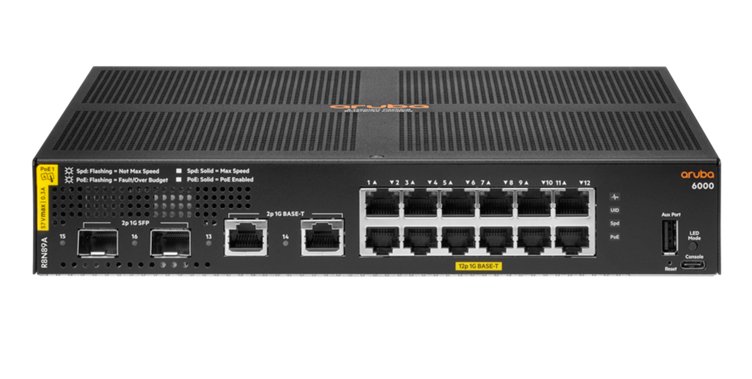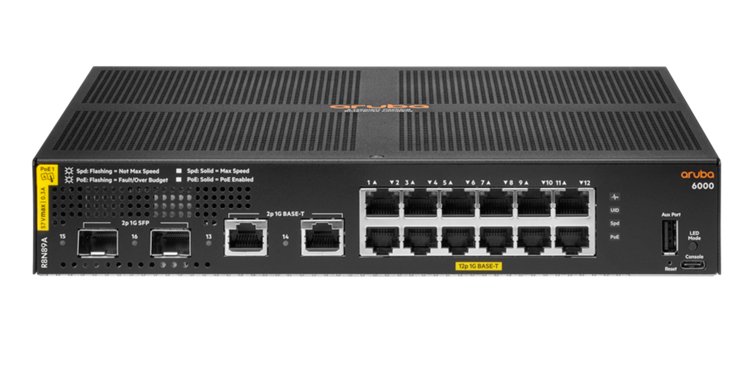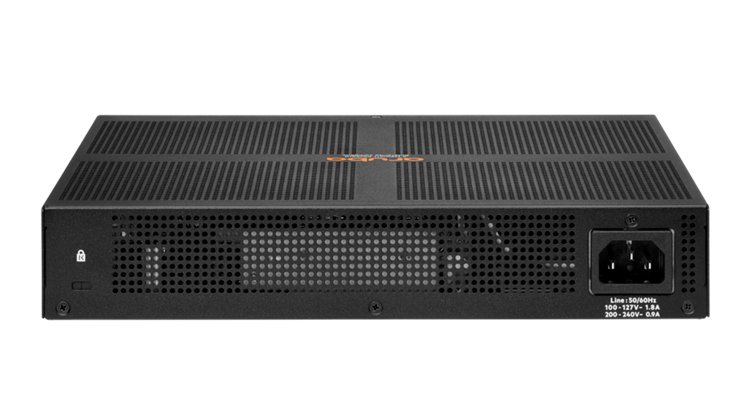HPE Aruba Networking CX 6000 12G Class4 PoE 2G/2SFP 139W Switch
Power Consumption Description: Max Power (w/o PoE): 21.9W Max Power (w/ PoE): 170W
Input Voltage: 100-127 VAC / 200-240 VAC
External I/O Ports: 12x ports 10/100/1000BASE-T Ports 2x 1G SFP ports 2x 1GbE ports
Latency: 1 Gbps: 2.3 μSec
Routing Capabilities: Static
Switching Capacity: 32 Gbps
Throughput: 23.8 Mpps
Memory and Processor: Dual Core ARM Cortex A9 @ 1016 Mhz 8 GB DDR3, maximum, depending on model 16 GB eMMC
PoE Capability: 139W Class 4 PoE/PoE+
Warranty Standard Statement: Limited Lifetime Warranty, see https://www.arubanetworks.com/support-services/ productwarranties/ for warranty and support information included with your product purchase
Weight (metric): 2.8 kg
Product Dimensions (metric): 4.4 x 25.4 x 25.5 cm
Operating Temperature: 32°F to 113°F (0°C to 45°C) up to 5000 ft (1.5 km) derate -1°C for every 1000 ft (305 m) from 5000 ft (1.5 km) to 10000 ft (3.0 km)
| Ports: 12x ports 10/100/1000BASE-T Ports 2x 1G SFP ports 2x 1GbE ports |
| Power Consumption: 170W (maximum) |
| Voltage: 100-127 VAC / 200-240 VAC |
| Capacity: 32 Gbps |
| Power Over Ethernet: 139W Class 4 PoE/PoE+ |
| Throughput: 23.8 Mpps |
| Warranty: Limited Lifetime |
HPE Aruba 6000 12G Class4 PoE 2G/2SFP 139W Switch (R8N89A)
The Aruba CX 6000 Switch Series is modern family of entry level access switches ideal for branch offices, midsize businesses, and small enterprises. Designed for reliable, simple, and security-enhanced access, the Aruba CX 6000 series provides a convenient and cost-effective wired access solution for networks supporting IoT, mobile, and cloud applications.
The Aruba CX 6000 series is based on the Aruba ASIC architecture with the programmable AOS-CX operating system used across the entire Aruba CX portfolio for a more consistent, more efficient operator experience. This fully-managed series has convenient built-in uplinks with up to 370W of Class 4 PoE to support IoT devices such as security cameras and wireless APs. A compact and fanless model is ideal for use in quiet, small work spaces. The Aruba CX 6000 series is easy to deploy and use with flexible management choices, allowing the best fit for your business and network environment.

Key Features
Entry Level Aruba CX Access Layer Switches
The Aruba CX 6000 Switch Series offers Ethernet gigabit connectivity and optional PoE to provide entry level, reliable, and convenient wired access connectivity for enterprise branch offices and SMB networks.
Using Aruba AOS-CX operating system across Aruba CX switching platforms and access-to-core-to-data center deployment domains provides a simpler, more consistent operator experience.
Fully-managed enterprise class switches deliver Layer 2 capabilities with support static routing, ACLs, robust QoS, traffic prioritization, sFlow, and IPv6 support.
Right size deployment with choice of 12, 24, and 48 port 1U models with convenient built-in 1GbE uplinks and up to 370W of Class 4 PoE.
Simplifies ownership with no switch software licensing or subscriptions required.
- Performance and Power
The Aruba CX 6000 Switch Series is designed with Aruba ASICs that deliver very low latency, increased packet buffering, and adaptive power consumption.
Deploy wireless access points and IoT devices with Aruba CX 6000 switch models that support up to 370W IEEE 802.3at Class 4 Power over Ethernet for up to 30W per port.
Up to four built-in wire speed 1GbE uplinks remove bottlenecks at the access layer where users and devices connect.
- Simplified Configuration and Management
The Aruba CX 6000 Switch Series provides flexibility to manage and simplify configurations with Aruba NetEdit, Aruba Central1, easy to use Web GUI, or industry standard CLI.
Aruba NetEdit introduces automation that allows for rapid network-wide changes, and verifies policy conformance post network updates.
Software-defined ready with REST APIs for fine-grained programmability of network tasks.
Reduce manual IT operation tasks around initial deployment or on-going configuration changes to accommodate adds, moves, and changes with colorless ports using local user roles and local-MAC-Authentication (LMA).





